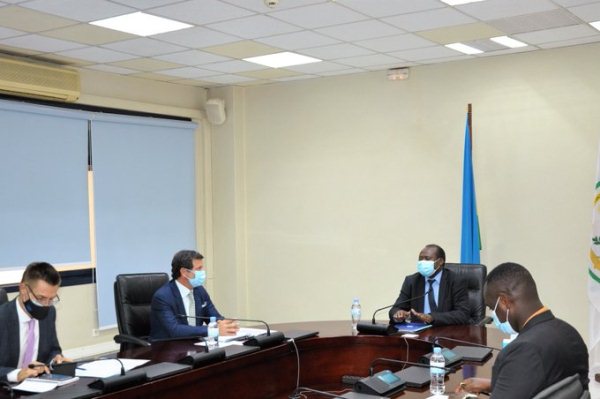
The Minister of Finance and Economic Planning Dr. Uzziel Ndagijimana met with EU Ambassador to the Republic of Rwanda, Nicola Bellomo, to discuss the future priority areas and programmes.
Building on Rwanda’s Vision 2050 and the NST1, the agreed next Multiannual Programme priorities for EU cooperation are: (i) Education, skills and jobs for the youth; (ii) a Green Deal for inclusive development (with a focus on agriculture and urbanization), as well as (iii) Political and Economic governance, including support for private sector development. The new EU-Rwanda cooperation strategy is expected to be finalized with further details in the coming weeks and start implementation early next year.
“The sustained development cooperation between Rwanda and European Union has contributed to key achievements in various sectors such as infrastructure more especially in energy and transport, and agriculture to name a few. We look forward to engage the EU to develop our cooperation in agreed future priority areas of cooperation that would ultimately contribute towards the realization of the National Strategy for transformation as well as vision 2050.” Dr. Uzziel Ndagijimana, the Minister of Finance and Economic Planning said.
The meeting follows a disbursement of Frw 42,5 billion (EUR 36.5 million) by the European Union by end of last Fiscal Year (June) which marks the completion of the two largest operations under the EU-Rwanda cooperation strategy for the period 2014-2020. This disbursement has been made in support of (i) the Agriculture Sector and (ii) the Government response to the COVID pandemic, in particular through the expansion of social protection support to most vulnerable households.
The disbursement is the last one of two programmes that have resulted in a total of EUR 350 million being transferred to the national treasury over the last 6 years. The programmes have supported Rwanda’s progress in the sectors of agriculture and energy, as well as the Government’s efforts to alleviate the impacts of the COVID-19 pandemic.
EU Ambassador, Nicola Bellomo said: “With the support of these two budget support programmes the EU has contributed to key achievements by Rwanda in the targeted sectors. This includes for instance the increase in access to electricity from 28% in 2015 to more than 60% today, or the design and implementation of the National Agricultural Policy that has led to a more productive and green agricultural sector, increasing for example almost threefold Rwanda’s land area under agroforestry”.
The agriculture budget support programme contributed to formulate and implement the National Agriculture Strategy (PSTA4) which is increasing agriculture yields and production. The EU programme also supported NAEB with over 400 Coffee farmers’ fields schools, as well as new laboratories. In addition, it contributed to provide access to irrigation for agricultural households and to increase water storage capacity in the country. Another achievement has been the increase in the land area under agroforestry from 58 000 hectares in 2013/14 to more than 150 000 hectares in June 2018.
The energy budget support programme has contributed to the Government efforts to increase access to electricity in the country: current access stands at 60%+ in total, compared to 28% in 2015. Power generation has tripled from 76MW in 2010 to 228MW in 2020, while the share of renewable energy sources has almost doubled over the last six years. The quality and stability of electricity supply has also significantly improved thanks to EU support for strengthening the grid.
Furthermore, following the COVID-19 pandemic in Rwanda, #TeamEurope provided over EUR 100 million through Government, Civil society Organizations and International Organizations to support the COVID-19 response and recovery.
The EU budget support consists of direct grants to the national budget of Rwanda to support the Government of Rwanda policies and actions in the identified sectors. The grant amounts are linked to the sector performance and to indicators successfully achieved.
#TeamEurope consists of the EU, its Member States – including their finance institutions and implementing agencies – as well as the European Investment Bank.(End)
